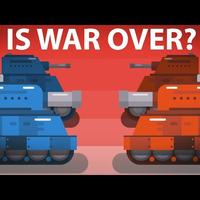Is War Over? — A Paradox Explained
Violence
and war.
The insane brutality of ISIS continues,
the Russians are invading Ukraine,
and the Palestinians and Israelis
continue to slug it out.
Does that make you feel gloomy?
Well
don't.
Because if you look at the numbers
war actually seems
to be going out of fashion,
while the global population
is at an all time high.
It seems that we live
in the most peaceful period
in human history.
How is this possible?
(music)
As of September 2014,
there were 4 conflicts going on
in the world that'd caused at least
10,000 people to die since January 2013.
9 conflicts that killed
more than 1,000 people
and 13 that killed
more than 100 since January 2013.
Not really peaceful,
but consider this:
of all the conflicts going on
none is an active war between countries.
They are either civil wars
or local conflicts.
Although civil wars are terrible
and cause huge suffering,
their impact is usually way smaller
than a war between nations or empires.
When two nations engage in war,
they can mobilise much bigger forces,
have access to all of the state's
resources and logistics and
almost all of the population.
So why have we transitioned from
wars between nation states
wars between nation states
A lot of it is to do with
colonialism and the cold war.
When the cold war ended, a major driver of
armed conflicts vanished too.
But the break up of the
communist dictatorships
revealed new or old tensions
and brought new conflicts
in the now freed states
which often resulted in civil war.
Much more importantly,
in 1945,
nearly all of Africa, much of Asia,
and parts of Latin America
were under colonial rule.
By 1990,
all but a few islands were independent.
But wait.
Couldn't you argue that what today's
multinational corporations
are doing in the third world
is just as bad as colonialism?
Let's look at Congo.
It was established as a colony in 1885
by the Belgium king.
An area 80 times the size of Belgium.
Violence committed against
the indigenous Congolese
and the ruthless system of
economic exploitation
had killed about half of the population
by 1908.
About 10 million Congolese were executed
or starved to death.
Millions were mutilated and traumatised.
The economic exploitation of the Congo
remained the top priority
and forced labor never really ceased
completely until the end of Belgium rule
in 1960.
Which is not really that long ago.
So, no.
Colonialism was much worse than
vulture capitalism is today
and it ended just two generations ago.
Most of the conflicts
that are going on right now
are in areas that 60 years ago
were under foreign control.
But things are getting better.
Until 1989,
victory for one side in a civil war
was common
while nowadays victories are much rarer.
At the same time,
negotiated endings have jumped from 10%
to almost 40%.
What about the rest of the world?
Why have nation states
stopped attacking each other?
There are 4 major reasons:
One.
Democratisation.
The steady development
from autocracy to democracy.
Democracies hardly ever fight each other.
Of all the state against state wars
fought since 1900, only a minority
were fought between democracies.
Two.
Globalisation.
War is just not as effective at achieving
economic goals as it used to be.
Today it's almost always cheaper
to buy resources on the global market
than to cease them by force.
People from other nations are
more valuable to us alive than dead.
Which, overall, is a pretty new concept.
Three.
War is so 20th century.
Until World War I, warfare was seen as an
inevitable part of the human experience
and as a valuable tool which you could use
to achieve goals when diplomacy
hit a brick wall.
Today we have rules that declare acts of
aggression illegal and stipulate that
armed forces is only justified in
self-defence or with the authority of the
UN Security Council.
These rules are still broken but today
it's harder to do so without sparking
oppositions and disapproval.
Also, we have an international court for
war crimes in The Hague.
And that's a very recent innovation.
Four.
Borders are mostly fixed now.
After World War II,
territorial wars generally stopped
when most countries pledged to accept
international borders
and respect other nations autonomy.
But is all of this just an anomaly
or are we on the road to lasting peace?
Truth is
we don't know yet.
We need a big enough sample to rule out
the historical average, which is about
one or two big wars per century.
We just haven't had enough time since
World War II to rule out the possibility
that war is not going away.
If we don't have one major war
in the next 75 years,
we can be really confident
that humanity is changing.
So you see, war might be over.
Yes there are nasty conflicts
going on in many places but overall,
things are getting better.
And we can make them even better
by speaking up for peace and democracy.
Subtitles by the Amara.org community

